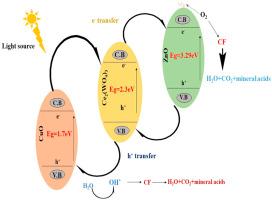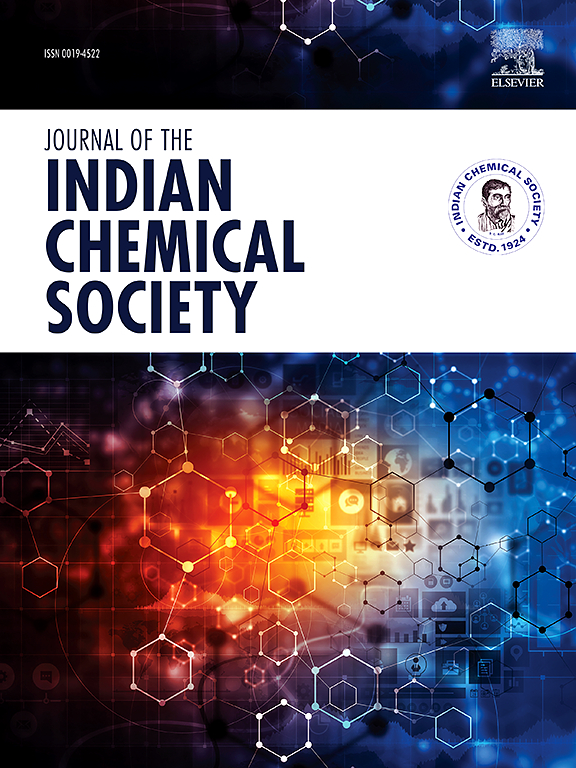Application of Ce2(WO4)3–ZnO–CuO nanocomposite as active photocatalyst for removal of ciprofloxacin from wastewater
IF 3.4
4区 化学
Q2 CHEMISTRY, MULTIDISCIPLINARY
引用次数: 0
Abstract
In this study, the synthesis of Ce2(WO4)3/ZnO/CuO nanocomposite (NCs) was carried out using Co-precipitation method. The structural, morphological and spectral confirmation was achieved through X-ray diffraction (XRD), Scanning electron microscopy (SEM), Differential reflectance spectroscopy (DRS) and Fourier transform infrared spectroscopy (FTIR) analysis. The degradation efficiency for photocatalytic degradation of Ciprofloxacin (CF) and band gap value of prepared Ce2(WO4)3/ZnO/CuO nanocomposite was determined by using UV–Visible and DRS analysis. Band gap value for Ce2(WO4)3/ZnO/CuO was found to be 1.39 eV. Effects of different parameters such as contact time, pH, and effect of concentration of catalyst were investigated to optimize degradation conditions. This prepared nanocomposite was used for the degradation of CF and about 91 % degradation efficiency of CF has been achieved at pH 5 within 70 min by irradiation under sunlight and 60 mg concentration of photocatalyst. The EDTA and IPA scavenged photo-generated holes and hydroxyl ions respectively, the decrease in photocatalytic degradation indicates that holes and hydroxyl ions are reactive species in photocatalytic degradation of CF. The value of R2 = 0.99 confirms the validity of Pseudo first order and Langmuir-Hinshelwood kinetic model for the degradation of CF. These results showed a novel method for the preparation of nanocomposite and the efficient degradation of antibiotics and can be applied to industrial manufacture.

应用 Ce2(WO4)3-ZnO-CuO 纳米复合材料作为活性光催化剂去除废水中的环丙沙星
本研究采用共沉淀法合成了 Ce2(WO4)3/ZnO/CuO 纳米复合材料(NCs)。通过 X 射线衍射 (XRD)、扫描电子显微镜 (SEM)、差示反射光谱 (DRS) 和傅立叶变换红外光谱 (FTIR) 分析对其结构、形态和光谱进行了确认。利用紫外-可见光和 DRS 分析测定了光催化降解环丙沙星(CF)的降解效率和制备的 Ce2(WO4)3/ZnO/CuO 纳米复合材料的带隙值。结果发现 Ce2(WO4)3/ZnO/CuO 的带隙值为 1.39 eV。研究了不同参数的影响,如接触时间、pH 值和催化剂浓度的影响,以优化降解条件。将制备的纳米复合材料用于降解 CF,在 pH 值为 5 的条件下,通过阳光照射和 60 毫克浓度的光催化剂,在 70 分钟内实现了约 91% 的 CF 降解效率。EDTA 和 IPA 分别清除了光产生的空穴和羟基离子,光催化降解率的下降表明空穴和羟基离子是光催化降解 CF 的活性物种。R2 = 0.99 的值证实了伪一阶和朗缪尔-欣舍伍德动力学模型对 CF 降解的有效性。这些结果表明了一种新型的纳米复合材料制备方法和抗生素的高效降解,可应用于工业生产。
本文章由计算机程序翻译,如有差异,请以英文原文为准。
求助全文
约1分钟内获得全文
求助全文
来源期刊
CiteScore
3.50
自引率
7.70%
发文量
492
审稿时长
3-8 weeks
期刊介绍:
The Journal of the Indian Chemical Society publishes original, fundamental, theorical, experimental research work of highest quality in all areas of chemistry, biochemistry, medicinal chemistry, electrochemistry, agrochemistry, chemical engineering and technology, food chemistry, environmental chemistry, etc.

 求助内容:
求助内容: 应助结果提醒方式:
应助结果提醒方式:


